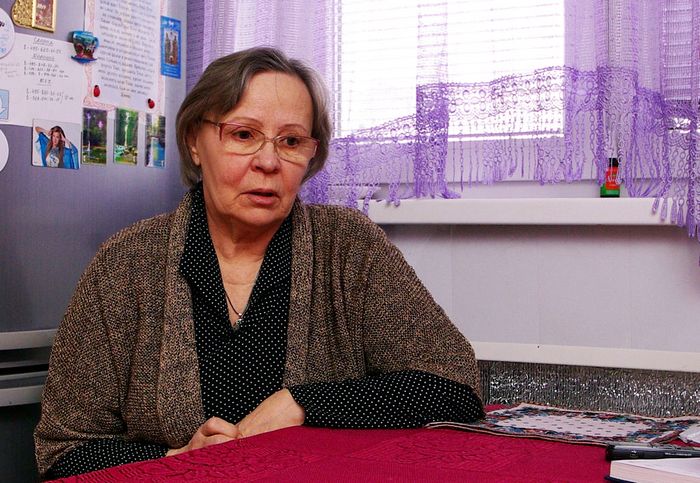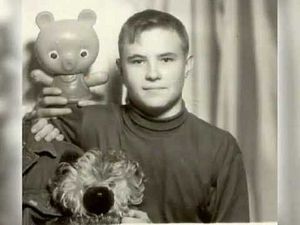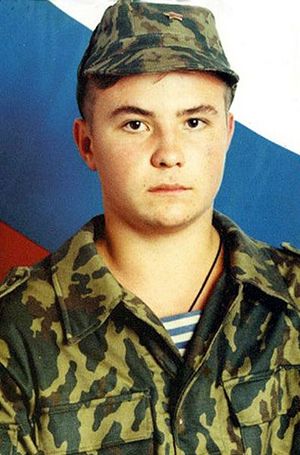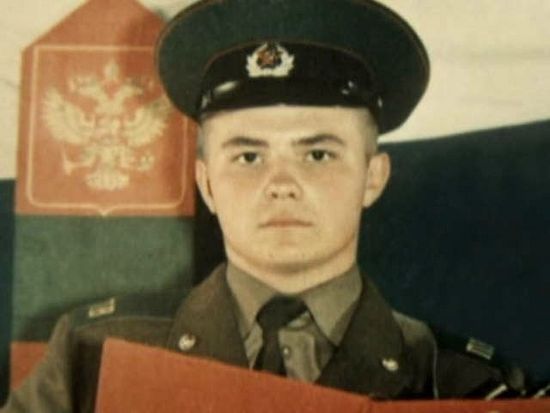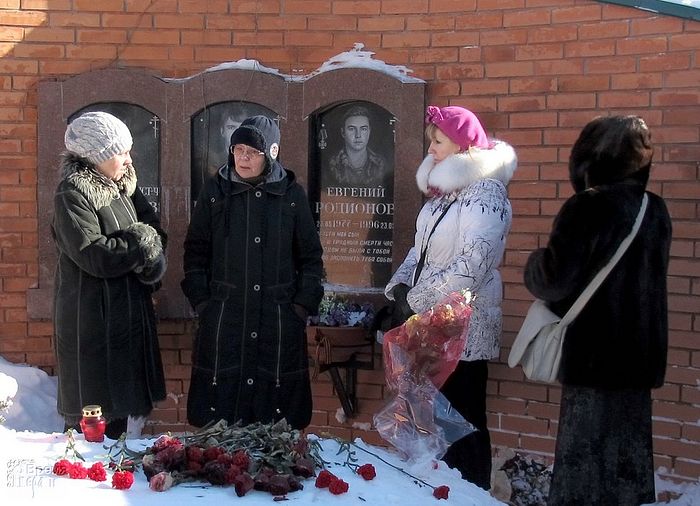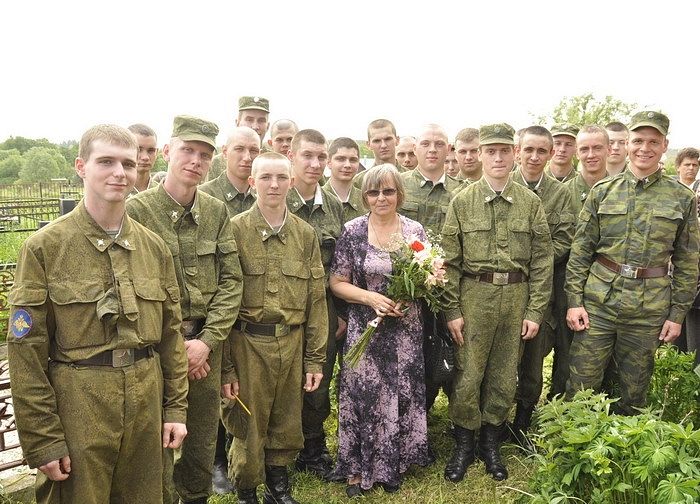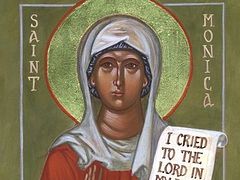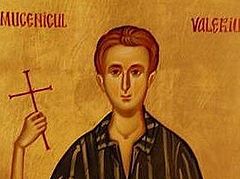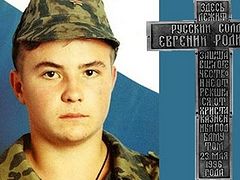Twenty years ago a martyric death for the faith claimed a soldier of the Russian border guards, Evgeny Rodionov: he was killed on May 23, 1996 by militants near the village of Bamut in Chechnya for refusing to remove his cross and convert to Islam. And before that he had endured a long captivity and cruel tortures …
On the anniversary of the murder of Evgeny the Warrior, remembering him and his mother’s search for her son, we spoke with her about responsibility, the indifference of the local officials, military honor, and remembrances of him.
—Lyubov Vasilievna, the heroic death of your son has united hundreds of thousands of people from around the world …
—Yes, and quite strangely, you will agree … Unless someone was expecting it? In the NATO army a service was composed and twice a year they commemorate him.[1] How did this spread? I myself have had nothing to do with it. My spiritual father from St. John the Theologian monastery told me it’s all in the will of God. If this was all just made up then the memory of Zhenya[2] would have died quickly. And now for twenty years I am amazed at how it is happening. On his anniversary a thousand people came. They weren’t ordered to come. Rostov, Ukraine, Kiev … A Liturgy was served at Zhenya’s grave. The people confessed and communed.
—Tell us please, how was your son as a child?
—Actually he was just a simple guy! There was only one unusual thing about him—he was never like an open book … He was an observer. He never initiated contact himself, but rather would stand back and examine a person. Only then, when he was short about him would he make a step forward.
He was very responsible. We were divorced, but Zhenya knew it wasn’t my fault. He was such a support in my life, that I never needed anyone else. He was a real man from seven years old. He took all the responsibility upon himself. I can’t even say that I raised him—life itself raised him—his environment. It was his first good teacher. He also had two wonderful grandmothers, both named Maria. He loved them very much. It’s them who lead him to God.
—His grandmothers spoke with him about God?
—His grandmothers, not me. And now I feel guilty about it. They baptized him when he was eleven. He came home with a cross on a string, and then he crossed himself. He took up casting and molding, making coins, figurines, and crosses.
—How did you feel when you received the telegram that he had gone AWOL?
—My world collapsed. My world collapsed because I immediately knew that it was impossible. Some disaster had occurred. Zhenya’s friends, our neighbors—no one believed it, that it was even possible. If I hadn’t gone to look for him, I don’t know how things would have turned out. Probably he would lie in the ground with the stigma of a “deserter.”
—As I was preparing for the interview, I noticed these words: “Betrayed as they were by politicians and surrounded as they were by the mockery of the glamorous press, the First Chechen campaign was much more arduous for the soldiers than for those of the Great Patriotic War.”
—It’s true. Here is a totally different story. Here they slurped filth and blood, there they fattened themselves. In the film of C. Govorukhin, a very good man, “The Damned and Forgotten,” everything is shown very honestly. Here they suffered, and there the dogs are licking caviar sandwiches. Here was a crazy feast during a plague. Some of the guys were in a totally different position. There was a very clear division.
—Besides mothers, family members and friends, no one especially thought about them …
—No one. The whole of the press was against them. Everyone was against them. They were barefoot and undressed. They didn’t have normal weapons. We weren’t prepared for any war. Especially terrible is that everyone was against them. Only the lazy didn’t spurn them. It was so offensive and hurtful. It forced me to break my oath, given to those bandits, and to speak the whole truth, because it was impossible to endure it. I knew what was happening there.
—Before we talk about your son’s podvig, I would like to remember your motherly podvig …
—Is it really a podvig? My dears, I didn’t carry out any podvig. I fulfilled my motherly duty, and that’s it—no need to turn me into a hero.
—But Lyubov Vasilievna, for the sake of this duty you walked into Chechnya through the minefields …
—And what mother wouldn’t? Show me the mother who wouldn’t go there!
—A rebel broke your spine …
—That’s true. Now complications have arisen over the years, and they also smashed my head. But is that what we’re speaking of? The matter is something else. Hope carried me. I hoped, and I walked through the minefields when we had to exhume my son. I already had nothing to lose; it was all the same to me.
—And you are still faced with the indifference of the local officials …
—It was terrible and now it’s the same. I will tell you just as a fact: none of the officials all these years have been to Zhenya’s grave. Now Dima Sablin[3] comes, the “Brothers in Arms” come, the border guards, internal troops and paratroopers, and yet from the local authorities no one ever, although Zhenya is an honorary citizen of the Podolsk region, and a cavalier of the Order of Bravery.
But probably amongst the politicians there are good people. But for some reason I have no luck with them. I’ve had more luck with the military, but not with the officials.
—The military is different?
—Yes, they are different. They’ve looked death in the face. They understand it. There was a time when there were many not very good people among them, but all the same they were in the minority. A military man serves. A public official doesn’t serve, but works, for himself. It’s a sad story. It’s unjust … Some Special Forces guys came here and said: “And what about the local authorities?!” I told them: “Guys, we can’t make them come here.”
If a person has love and compassion and the desire to help, to support, he will share it. And if not, he’s an unlucky and unhappy person. Mother’s day, birthday … I never receive even a single flower. And they are still trying to blame me: it’s not what is said, but what isn’t said.
—There are many more people who do understand everything.
—Yes, there are more. I’ve met such priests over the years!—Fr. Dimitry Smirnov, Fr. Vladislav Provotorov. I go to the church at Pavlovskaya Sloboda. We have an inextinguishable candle always standing there. We have a list for the Maikop Brigade, Sixth Company, “Kursk.” That’s its own story. Paratroopers from Bear Lake come on the day of the death of the Pskov Company, in full form. They loudly call out the names of everyone who was killed. We serve a Panikhida. It sends shivers down my spine. I go there because there is a military spirit there.
I really love Fr. Michael Vasiliev because he, like me, has jumped with a parachute.
I have unending respect for soldiers. Regardless of where they would like to live, they go there where the Motherland sends them. Therefore I really respect them. They are people of my blood.
—Speaking of the local officials, you washed the floors in the Khankala hospital …
—No, no no, it wasn’t a hospital. It was a hotel.
—A hotel?
—The General’s hotel in Khankala. Generals Troshev and Shamanov lived there. I know them all, and they know me. Lebed lived there, with whom I had a clash. It’s a hotel just for the generals’ staff.
—And you had to do this to earn money to continue your search for your son?
—Yes. With that money I could then drive and not walk. When I arrived I didn’t have a single kopek. Nine months … Is that how long I needed to take money with me, to live for such a long time?! Yes, I worked.
—Do you remember your meeting with the insurgent who told you where the body of your son was?
—It wasn’t so easy. To travel to Bamut I had to go see Ruslan Khaikhoroev seventeen times.
—Is he your son’s murderer?
—Yes, to arrange the removal my son’s body, and whatever other conditions we had to meet. We fulfilled a whole heap of conditions. They released many people from prison. Seventeen times to this dealing I traveled alone, and once Vyacheslav Pelepenko was with me. He was there on the night that we exhumed his body.
—And you yourself began to dig up the bodies of the dead?
—Yes. We met all of his conditions, but all the same to retrieve the bodies we had to act as if we were stealing them. He kept placing different conditions on us. It was already the twenty-third of October and leaves were falling. The next year his grave would have been leveled-out already, and it would have been impossible to find it. They dug them in June.
—Did the rebel himself tell you that your son had been killed?
—Yes, it was no secret. It was said in the presence of representatives of the Organization for Security and Cooperation in Europe. It already wasn’t a secret. The locals told me: “Don’t take the men. Let it be a grave.” So, it wasn’t a secret.
When we gave up Chechnya for three years there was complete anarchy. Everything was in disarray and complete chaos. And of course, everyone was armed.
—What did this insurgent tell you about what kinds of trials your children endured? I say specifically “children” because you have really become a mother for many soldiers.
—Indeed, they are my children, because I looked for them and I found them. There are four cypresses standing at Zhenya’s grave—I mean because there were four of them. I never separate them from each other. They are all mine. It just so happened that only Zhenya was wearing a cross, and they had medallions. But they were all baptized in their blood. There was even the phrase “Evgeny Rodionov and those slain with him.” By the way, in Kharkov there was a church built in honor of the podvig of Evgeny Rodionov and those killed with him.
The rebel said that they didn’t want to obey. He said: “They didn’t want to become our brethren. We either break them or we kill them.”
—They ordered him to remove his cross?
—Of course. Then they were interrogated by the FSB. They were all ordered to remove their crosses. Now they talk about ISIS. Then, in 1995, ISIS was already in the Caucasus. Zhenya is a victim of ISIS. They beat them and ran away to Syria.
—In all you made about sixty mission trips to the “hot spots,” taking food, warm clothes for the soldiers …
—How were they mission trips?! They were trips with gifts of kindness. We all gathered them. I only took them there. I was just trying to be useful. God gave us such opportunities. It was such a joy, such happiness. You’re not barren; you can do something kind for people. In every one of those soldiers I saw the characteristics of my son. So many were involved in this work then, including the churches of Fr. Dimitry Smirnov and of Fr. Alexander Shargunov, and soldiers, and retirees.
For a while Fr. Alexander Shargunov kept Zhenya’s cross. Then I took it because people can to arrive from the war and wanted to venerate it. In the church there are rules. They bring it out only on Sundays, as a relic. I felt it was not quite correct because people were coming from the front, and they needed to see it now. His cross has been in Syria, Donbass, in Crimea, in hospitals.
—You lived with different families in Chechnya, spoke with simple Chechens, with civilians …
—They are different. If I walked to some devastated village, they would throw sticks at me and belittle me, and they themselves were crying. Their people were also killed. And if the village wasn’t destroyed then they understood me and would give me a cup of tea and a piece of bread. It was through ordinary people that I went to see the ringleader of the rebels. One woman said to me: “We’re not all bad, and we’re not all good.” The elders, oddly enough, treated me very respectfully, and sat me behind the table, which in the Caucasus is a high honor. They saw in me a mother, and maybe they were taught by 1944.
—What do you think when you see boys and girls who have their own problems? What advice do you give when you meet with them?
—I speak with many young people. I want only one thing: that with every step we would bear responsibility. Don’t think about yourself, but think about your mother. Your mother gave birth to you and raised you. What turns out well for the child lies with the mother. We should be responsible for all of our actions, first and foremost.

